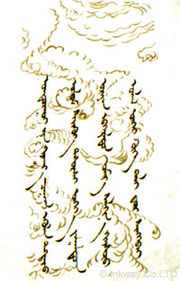
Vanchinbalyn Injinash
Encyclopedia

Liaoning
' is a province of the People's Republic of China, located in the northeast of the country. Its one-character abbreviation is "辽" , a name taken from the Liao River that flows through the province. "Níng" means "peace"...
, China.
His verses, stories and novels are distinguished by their markedly civic sentiments and strong social criticism. The Blue Chronicle, a historical novel, is perhaps one of his best known works, it is about the events of the thirteenth century, and upholds humanistic and profoundly patriotic ideals.
In another of his important works, One-Storey Pavilion, a two-part social novel, he describes life in southern Inner Mongolia, and the tragic fate of its young people under the Manchu yoke, and their struggle for human dignity.
One-Storey Pavilion and another novel The Chamber of Red Tears bear a striking resemblance to Chinese literature such as Dream of the Red Chamber
Dream of the Red Chamber
Dream of the Red Chamber , composed by Cao Xueqin, is one of China's Four Great Classical Novels. It was composed in the middle of the 18th century during the Qing Dynasty. It is considered to be a masterpiece of Chinese vernacular literature and is generally acknowledged to be a pinnacle of...
. In addition, they contain a considerable amount of Chinese loan words and direct translations from Chinese, which are difficult for readers unfamiliar with Chinese to understand. Anyway he continued to write Mongolian and never adopted a pro-Chinese stance.
Injinash's works were translated into Chinese, English, Russian and German languages after 1930s.
Life
He was born in Tümed Right Wing Banner of Josutu LeagueJosutu League
The Josutu League was a league of Mongolia during the Manchu Qing Dynasty. It was the southernmost league of the Mongol land and neighbored China. It faced devastating floods of Chinese colonization...
, Inner Mongolia (modern-day, Beipiao
Beipiao
Beipiao is a city in Chaoyang prefecture, Liaoning province, in Northeast China. It has a population of 202,807. The main industry in the area is coal mining. With vertical shafts of almost 1000m, these are some of the deepest coal mines in China. The coal produced is used for coking...
, Chaoyang, Liaoning Province). He had a childhood name Khaschuluu (qasčilaɣu, Хасчулуу), Chinese name Baoying (寶瑛) and courtesy name Runting (潤亭). His father Vanchinbal (vangčinbala, Ванчинбал) was a taiji (Mongol title)
Taiji (Mongol title)
Taiji is the title of the nobility among the Mongols from the 16th century. The title originated from Chinese taizi and was first used for the proliferating aristocracy composed of sons and descendants of Batu-MÖngke Dayan Khan...
, and hence, a descendant of Genghis Khan
Genghis Khan
Genghis Khan , born Temujin and occasionally known by his temple name Taizu , was the founder and Great Khan of the Mongol Empire, which became the largest contiguous empire in history after his death....
. Injinash's mother was Vanchinbal taiji's lady Mayukha. Vanchinbal was a bookcollector of Mongolian, Classical Chinese, Manchu and Tibetan literature. According to Injinash's preface, the first eight chapters of The Blue Chronicle were written by Vanchinbal. His family was highly literate in Mongolian, Manchu, and Chinese languages.
His father, Vanchinbal, was a banner adiminstrator of Tümed Right Banner (modern Beipiao county, Liaoning province) and his position was inherited by two of his sons, Gularansa (1820–51) and Süngwaidanjung (1834–98). These two also translated the Chinese novel: Shuihu zhuan (Outlaws of the marsh) into Mongolian, and like their middle brother, Gungnechuke (1832–66), were poets. Injinash claimed he worked on The Blue Chronicle with his two brothers. Injannashi married twice and his first wife was the daughter of a Kharchin
Kharchin
Kharchin is a subgroup of the Mongols residing mainly in North-western Liaoning and Chifeng, Inner Mongolia. There are Khalkha-Kharchin Mongols in Dorno-Gobi Province and in Ulaanbaatar.They are descended directly from the Kharchin tümen of the Northern Yuan Dynasty...
prince and had two sons.
As Tümed Right Wing Banner was close to China, it was subjected to an enormous population pressure from China. By the time Injinash was born, the banner has been transformed into agricultural land by the Chinese, who outnumbered the indigenous Mongols. Apparently, this situation led Injinash to depicts in The Blue Chronicle (Mongolian: Köke Sudar) the glorious past of the Mongols of Genghis Khan's time.
A rebellion by his family’s Chinese tenants in 1870 and the failure of the Injanish family's investment in a coal mine caused financial distress. The ethnic tensions between the Mongols and Chinese resulted in the Jindandao Incident
Jindandao Incident
The Jindandao Incident refers to a rebellion by a Chinese secret society called Jindandao , who rose in revolt in Inner Mongolia in November 1891 and massacred tens of thousands of Mongols before being suppressed by government troops in late December...
of 1891. The Chinese rebels massacred tens of thousands of Mongols and devastated the Mongol society of the Josutu and Ju'udu Leagues. These factors forced Injinash to flee to Jinzhou
Jinzhou
Jinzhou , is a prefecture-level city of Liaoning province, China. It is a geographically strategic city located in the "Liaoxi Corridor" , which connects land transportation between North China and Northeast China. Jinzhou is China's northernmost seaport and the coastal economic center of West...
, and he died in Liaoning on 25 February 1892.
Works
- The Blue Chronicle (köke sudur, Хөх судар (Khökh Sudar))
- The Chamber of Red Tears (ulaɣan-a ukilaqu tingkim, Улаанаа Ухилах танхим (Ulaanaa Ukhilakh Tankhim))
- One-Storey Pavilion (nigen dabqur asar, Нэгэн Давхар Асар (Negen Davkhar Asar))
Links
- Oral and Written Literature Consulate of Mongolia in Hong Kong

